
January 10
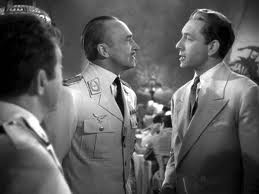
1908 Birth: Paul Henreid: Trieste-born American actor and film director, best remembered for playing Victor Laszlo in Casablanca (1942).
Henreid was the son of an aristocratic Viennese banker. He studied theatre in Vienna and debuted on the stage under the direction of Max Reinhardt. He began his film career acting in German films in the 1930s, but left Austria in 1935 for Great Britain [with the rise of Austrian fascism]. With the start of World War II, Henreid risked deportation or internment as an enemy alien, but Conrad Veidt spoke for him and he was allowed to remain free in England. A small role in Goodbye, Mr. Chips (1939), and third billing as a Nazi Major in Night Train to Munich (1940), led to him settling on a Hollywood career.
In 1942, Henreid appeared in his two most important films. In Now, Voyager, he and Bette Davis created one of the screen's most imitated scenes, in which he lights two cigarettes and hands one to her. Henreid's next role was as Victor Laszlo, heroic anti-Nazi leader, in Casablanca with Humphrey Bogart and Ingrid Bergman. In 1946, Henreid became a citizen of the United States. [Note: Good of Conrad Veidt to help Henreid avoid deportation from Britain. As Major Strasser (center), Veidt wanted to arrest Victor Laszlo (right) in Casablanca! For further information, click here]
1911 Caroline Islands: Two German cruisers, the Emden and the Nurnberg, suppress a native revolt on the island of Ponape in the Pacific, firing on the island and landing troops.
1914 Adolf Hitler: The Munich Police inform Linz, Austria, where Adolf Hitler is wanted for failing to register for the military, that he is living at 34 Schleissheimerstrasse, Munich. See Dec 29 and Jan 18. (Maser) [For further details, Click here.]
1918 World War I: Brest-Litovsk Peace Conference: Ukrainian President Vinichenko's Appeal:

1. The entire democracy of the Ukrainian State is striving for the termination of the war, for peace throughout the entire world, and a general peace between all the belligerent powers must be democratic and must assure to every people, even the smallest, full and unlimited national self-determination.
2. The peace which is to be concluded between all the powers must be democratic and must assure to every people, even the smallest, full and unlimited national self-determination.
3. In order to render possible the real expression of the people's will, proper guarantees must be given.
1920 League of Nations instituted:
On January 10, 1920, the League of Nations formally comes into being when the Covenant of the League of Nations, ratified by 42 nations in 1919, takes effect.
In 1914, a political assassination in Sarajevo set off a chain of events that led to the outbreak of the most costly war ever fought to that date. As more and more young men were sent down into the trenches, influential voices in the United States and Britain began calling for the establishment of a permanent international body to maintain peace in the postwar world. President Woodrow Wilson became a vocal advocate of this concept, and in 1918 he included a sketch of the international body in his 14-point proposal to end the war.
In November 1918, the Central Powers agreed to an armistice to halt the killing in World War I. Two months later, the Allies met with conquered Germany and Austria-Hungary at Versailles to hammer out formal peace terms. President Wilson urged a just and lasting peace, but England and France disagreed, forcing harsh war reparations on their former enemies. The League of Nations was approved, however, and in the summer of 1919 Wilson presented the Treaty of Versailles and the Covenant of the League of Nations to the U.S. Senate for ratification.
Wilson suffered a severe stroke in the fall of that year, which prevented him from reaching a compromise with those in Congress who thought the treaties reduced U.S. authority. In November, the Senate declined to ratify both. The League of Nations proceeded without the United States, holding its first meeting in Geneva on November 15, 1920.
During the 1920s, the League, with its headquarters in Geneva, incorporated new members and successfully mediated minor international disputes but was often disregarded by the major powers. The League's authority, however, was not seriously challenged until the early 1930s, when a series of events exposed it as ineffectual. Japan simply quit the organization after its invasion of China was condemned, and the League was likewise powerless to prevent the rearmament of Germany and the Italian invasion of Ethiopia. The declaration of World War II was not even referred to by the then-virtually defunct League.
In 1946, the League of Nations was officially dissolved with the establishment of the United Nations. The United Nations was modeled after the former but with increased international support and extensive machinery to help the new body avoid repeating the League's failures. (History.com)
1920 The Versailles Treaty takes effect, sharply limiting the ability of the defeated Germans to develop or deploy a whole range of weapons systems, from submarines to aircraft. However, the signers of the Treaty neglect to make any mention whatsoever of rockets. Research into missile technology thus by default gains a legal basis and will be vigorously explored during the ensuing Weimar Republic, and later by Hitler's Third Reich. [See: Wunderwaffen: Hitler's Deception and the History of Rocketry.]
1922 Griffith elected president of Irish Free State:
Arthur Griffith, the founder of Sinn Fein and one of the architects of the 1921 peace treaty with Britain, is elected president of the newly established Irish Free State.
In 1905, Griffith founded Sinn Fein, a political party dedicated to independence for all of Ireland. From its inception, the party became the unofficial political wing of militant Irish groups in their struggle to throw off British rule. In 1911, the British Liberal government approved negotiations for Irish Home Rule, but the Conservative Party opposition in Parliament, combined with Ireland's anti-Home Rule factions, defeated the plans.
With the outbreak of World War I, the British government delayed further discussion of Irish self-determination, and Irish nationalists responded by staging Dublin's Easter Uprising of 1916. Though Griffith played no direct part in the rebellion, he was imprisoned along with other nationalist leaders. In 1918, with the threat of conscription being imposed on the island, the Irish people gave Sinn Fein a majority in national elections, and the party established an independent Irish Parliament—Dail Eireann—which declared Ireland a sovereign republic.
In 1919, the Irish Volunteers, a prototype of the Irish Republican Army (IRA), launched a widespread and effective guerrilla campaign against British forces. During this time, Griffith acted as head of the Irish Republic and led civil disobedience efforts. In 1921, a cease-fire was declared, and in 1922 Arthur Griffith and a faction of former Sinn Fein leaders signed a historic treaty with Britain, calling for the partition of Ireland, with the south becoming autonomous and the six northern counties of the island remaining in the United Kingdom.
Griffith was subsequently elected the first president of the new country but died in the same year just as civil war broke out in Ireland over the partition. The cause of death was ruled overwork.
[Note: The Irish Republic was neutral in World War II, although it was bombed by Germany on a couple of occasions along with (British) Ulster.]
1923 U.S. troops depart Germany:

Four years after the end of World War I, President Warren G. Harding orders U.S. occupation troops stationed in Germany to return home.
In 1917, after several years of bloody stalemate along the western front, the entrance of America's well-supplied forces into World War I was a major turning point in the conflict. When the war ended in November 1918, more than two million American soldiers had served on the battlefields of Western Europe, and more than 50,000 of them had lost their lives.
As part of the Treaty of Versailles, signed the next year, U.S. troops, along with other Allied forces, were to occupy the defeated Central Powers nations to enforce the terms of the peace agreement. In Germany, Allied occupation and stiff war reparations levied against the country were regarded with increasing bitterness, and in 1923, after four years of contending with a resentful German populace, the American troops were ordered home. (History.com)
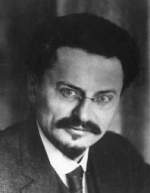
1928 Leon Trotsky: exile ordered by the Soviet Union.
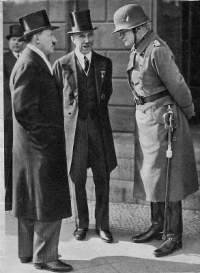
1933 Weimar: Franz von Papen and Adolf Hitler have their second meeting, this time in Ribbentrop's home in Dahlem, a suburb of Berlin. Hitler is furious when Papen tells him that Hindenburg is still opposed to a Hitler Chancellorship and breaks off the discussions to await the outcome of the January 15 elections in the tiny state of Lippe-Detmold. Hitler hopes that a strong showing in this election will bolster his position.
1934 Death: Marinus Van der Lubbe: beheaded by guillotine in Leipzig for setting the Reichstag on fire:
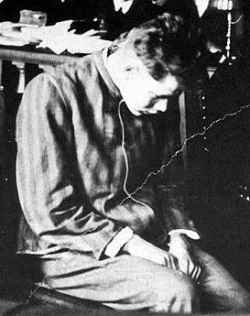
A watershed event in the formation of the Nazi dictatorship, the Reichstag fire, days before a parliamentary election, enabled Hitler to stampede voters, suspend civil liberties, suppress left-wing parties on grounds of a suspected Communist plot, and seize 'emergency' powers he would never relinquish.
Van der Lubbe, who was arrested on the scene, suffered the predictable fate. Four other Communists charged as accomplices were acquitted, in a trial with the gratifying spectacle of Hermann Goering personally testifying, and being undressed on cross-examination by one of the reds. One is reminded here that Hitler did not yet have everything in the state apparatus at his beck and call . . . . although he did have a great deal already, inasmuch as the arson law under which Van der Lubbe died was passed after the Reichstag fire and made retroactive.
If the big-picture outcome of the Reichstag fire is pretty clear-cut, its real origin and the corresponding [correctness] of the judicial verdicts have remained [questionable] ever since . . .
Van der Lubbe confessed, so his participation is generally taken as a given. Whether he was really able to start the blaze acting alone, as he insisted, and the Nazis 'only' exploited this fortuitous calamity; whether he was part of a larger leftist plot, as his prosecutors claimed; or whether, as Shirer and many others since have viewed him, he was a patsy in a false flag operation set up by the Nazis with an eye towards creating a politically advantageous national emergency—these possibilities remain very much up for debate.
1934 Netherlands: The government announces that all government employees belonging to the Nazi Party will be fired immediately.
1937 Antisemitism: The Polish government dissolves the Warsaw Jewish Kehilla.
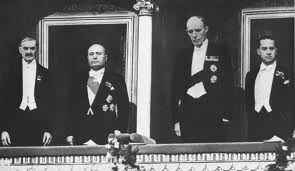
1939 Diplomacy: Neville Chamberlain and Lord Halifax arrive in Rome to meet with Mussolini.
1940 World War II: Various:
Oops!: The BIG DAY for the German attack on France is set for January 17, but things are not going all that well for Hermann Goering, head of the German Luftwaffe, who is 'beside himself' with rage. One of his own officers, detailed to deliver the secret war plans to a parachute division in Cologne, gets drunk and misses his train. Disregarding security procedures, the hung-over officer hitches a ride on a light plane, which promptly gets lost and is forced to make a landing in, of all places, Belgium; the main invasion route. The derelict officer reports through the German Legation, that he had succeeded in burning the plans "to insignificant fragments, the size of the palm of a hand" before Belgian soldiers interrupted him. But now Goering has a real problem. He must be certain that the enemy doesn't have these vital plans. He experiments with burning a packet of papers similar to those in question, but only burns his hand in the process. He even consults a psychic, who assures him that the plans are completely destroyed.
Unfortunately for Goering, a Brussels newspaper soon publishes the story that a Belgian officer has recovered the plans virtually intact. The Belgian authorities pass on details of the German invasion to the British and French. Hitler is forced to postpone the invasion, but he is less upset than he would have been if he'd actually been confident in the war plan. He felt it was too conservative and obvious, even without copies being in enemy hands. He will use this alleged violation of neutrality by Belgium to justify the invasion of that country in May, while using the time between to subtly alter the invasion plans, setting his enemies up for annihilation. [See: Was Hitler 'Forced' Into the War?]
German planes attack 12 ships off the British coast; three sink and 35 are dead. [See: Why Did Hitler Lose The Battle of Britain?]
1941 World War II: Various:
The Lend-Lease Bill is introduced to the US Congress, where it encounters considerable opposition. Former ambassador to Great Britain Joseph Kennedy, and Aviator Charles Lindbergh are vocal opponents.
The legislation gave President Franklin D. Roosevelt the powers to sell, transfer, exchange, lend equipment to any country to help it defend itself against the Axis powers. A sum of $50 billion was appropriated by Congress for Lend-Lease. The money went to 38 different countries with Britain receiving over $31 billion.
USSR and Germany agree on the East European borders and the exchange of industrial equipment. [See: Worst Dictator of Modern Times: Hitler or Stalin?]
1942 Various:

World War II: The Jeep: The Ford Motor Company signs a contract to make Jeeps, the new general-purpose military vehicles desperately needed by American forces.
Holocaust: German Jews are ordered to turn in all of their wool and fur clothing.
1943 World War II: Various:
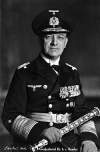
From a memorandum by Raeder:
The Importance of German Surface Forces for Conducting the War by the Powers Signatory to the Three Power Pact . . . . it was planned by the leaders of the National Socialist Reich to give the German Navy by 1944-45 such a strength that it would be possible to strike at the British vital arteries in the Atlantic with sufficient ships, fighting power, and range . . . . In 1939, the war having begun 5 years earlier, the construction of these forces was still in its initial stages,"
Stalingrad: The Red Army launches an offensive aimed at reducing the Stalingrad pocket. The Soviet 62nd and 64th Armies to the east and southeast are notably under-strength. The main forces engaged in the offensive are the Soviet 65th and 22nd Armies to the west. Forces of the German 6th Army are forced to retreat. [See: Campaign in Russia.]
1944 The first mobile electric power plant in the US is delivered by the General Electric Company to the U.S. Navy Bureau of Yards and Docks, Navy Yard, Philadelphia, Pa. It was built within six specially designed railway cars. Oil-fired boilers powered a steam-turbine generating plant, accompanied by the switchgear and transformer apparatus. The unit could be hauled at speeds up to 40 mph to a new destination where it could be set up within 24 hours, with a capability of generating 10,00 kilowatts of electric power.
1945 Various:
World War II: Ardennes: US First and Third Armies continue to advance. [See: The Last Days of the Third Reich.]
Churchill to FDR:
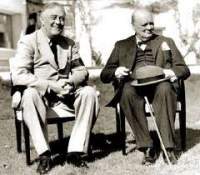
Eden has particularly asked me to suggest that Stettinius might come on forty-eight hours earlier to Malta with the United States Chiefs of Staff, so that he (Eden) can run over the agenda with him beforehand. Even though Molotov were not invited, I am sure this would be found very useful. I do not see any other way of realizing our hopes about a World Organization in five or six days. Even the Almighty took seven. Pray forgive my pertinacity.
1946 Various:
First meeting of the United Nations:
The first General Assembly of the United Nations, comprising 51 nations, convenes at Westminster Central Hall in London, England. One week later, the U.N. Security Council met for the first time and established its rules of procedure. Then, on January 24, the General Assembly adopted its first resolution, a measure calling for the peaceful uses of atomic energy and the elimination of atomic and other weapons of mass destruction.
In 1944, at the Dumbarton Oaks conference in Washington, D.C., the groundwork was laid by Allied delegates for an international postwar organization to maintain peace and security in the postwar world. The organization was to possess considerably more authority over its members than the defunct League of Nations, which had failed in its attempts to prevent the outbreak of World War II. In April 1945, with celebrations of victory in Europe about to commence, delegates from 51 nations convened in San Francisco to draft the United Nations Charter. On June 26, the document was signed by the delegates, and on October 24 it was formally ratified by the five permanent members of the Security Council and a majority of other signatories. (History.com)
Nuremberg Tribunal: Thirty-First Day
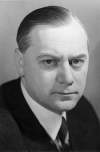
Continuation of the Case Against Rosenberg;

Presentation of the Case against Frank;
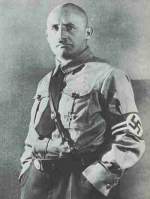
Presentation of the Case Against Streicher;
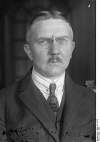
Beginning of the Case Against Schacht.
Lt. Colonel Baldwin:The whole tragic history of slave labor and recruitment of workers has been placed before this Tribunal in great detail. When the Defendant Frank refers to these methods as his fifth reason for disaffection in Poland in his report to Hitler, he once more cites policies which he executed. Force, violence, and economic duress were all supported by him as means for recruiting laborers for deportation to slavery in Germany. This was an announced policy.
1947 Holocaust: The British stop the refugee ships Independence and In-Gathering from landing in Israel. [For further details, Click here.]
1970 Rudolf 'Rudi' Wolters—Albert Speer's friend and archivist—replies to Speer's January 1 letter:
This business of 'drifts' which you now want to 'set to rights' is of course a confounded nuisance. Before we consider what best to do, I'd like to explain in a few words how it came to this cleansing, which I did mention in passing when I delivered the manuscript to you . . . . As I had originally had only kept one (complete) copy of the Chronik, which, incidentally, I thought was the only one that had survived, and this was . . . in very bad condition. I decided to have the approximately 800 pages copied and equipped with an index. There was an obvious need to check the whole thing before it was copied, make some stylistic and grammatical corrections and delete a few things which were either just silly or irrelevant to contemporary history. As it was I who selected what to include in the first place, I felt quite justified twenty years later in removing a few things I considered immaterial. It is true, however, that I also felt obligated to take out a few—a very few—notes which, historically, are unfortunately not entirely unimportant. For instance: 'In the time from October 18 to November 2, 1941, about 4,500 Jews were evacuated from Berlin. This provided one thousand further habitations for people affected by the bombings., which the General Building Inspector was able to make available (for them) . . . . "This kind of thing, which occurred repeatedly, then culminated in a closing report by your associate Cl (Dietrich Clahes) which concluded that 75,000 'persons' were 'moved' with the result that 23,765 Jewish habitations were seized. That was of course an achievement! . . . .
I would not welcome for it to be passed on . . . even photocopied, because in the original the crossed-out paragraphs are clearly visible even when the pencil marks are erased. The method of correction I suggest can be explained to the archive fellows as being simpler and cheaper than photocopying 800 pages. Or, if you like, just tell them 'The fellow refuses to hand over the original.' I'll be delighted to tell them my reasons. Aside from this you can rest easy: I have made arrangements that the original is to be made available to the public when no one can any longer be harmed by it . . . . Another solution would be to say for the moment, that Marion (Reisser) has destroyed the original . . . . Now over to you for decision, great Master of Armaments! (Sorry!)" (Sereny)
1979 Volkswagen Beetle:The last convertible planned is produced. [See: The Fuehrer's Mercedes.]
1997 Italy: Oops!: new 1,000 lire coin shows a map including divided Germany.
Edited by Levi Bookin (Copy editor)
levi.bookin@gmail.com
FAIR USE NOTICE: This site may contain copyrighted material the use of which has not always been specifically authorized by the copyright owner. We are making such material available in our efforts to advance understanding of historical, political, human rights, economic, democracy, scientific, environmental, and social justice issues, etc. We believe this constitutes a 'fair use' of any such copyrighted material as provided for in section 107 of the US Copyright Law. In accordance with Title 17 U.S.C. Section 107, the material on this site is distributed without profit to those who have expressed a prior interest in receiving the included information for research and educational purposes. If you wish to use copyrighted material from this site for purposes of your own that go beyond 'fair use', you must obtain permission from the copyright owner.
Please note that the list-owner and moderators are not responsible for, and do not necessarily approve of, the random ads placed on our pages by our web server. They are, unfortunately, the price one pays for a 'free' website.